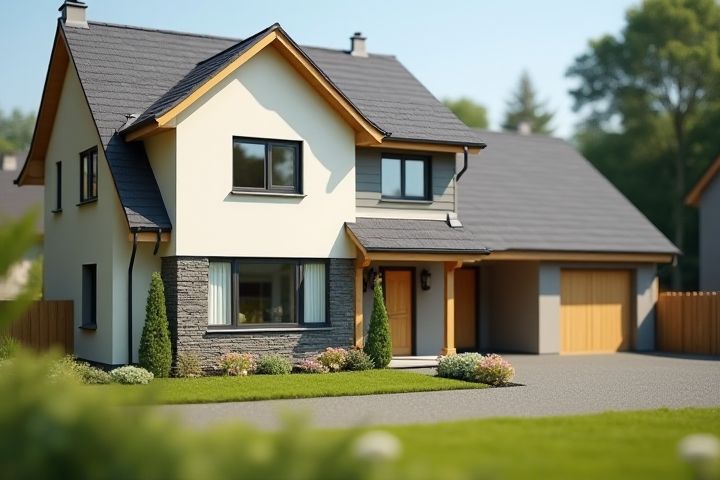
A new house often features the latest building codes, energy-efficient appliances, and modern designs that contribute to lower utility bills and enhanced comfort. With the added benefit of customization, you can choose layouts and finishes that suit your personal style and needs. Conversely, a used house can offer established landscaping, charm, and often a more affordable price point. However, older homes may require renovations or updates, which could lead to unforeseen costs. Ultimately, the choice between a new or used house hinges on your budget, lifestyle preferences, and willingness to invest in renovations.
Is A New House Better Than A Used One
Cost
A new house typically comes with a higher price tag, often ranging from 10% to 20% more than similar used homes, primarily due to modern construction materials and energy-efficient technologies. However, new houses may lead to long-term cost savings through lower maintenance and repair costs, which often incur hefty expenses in older homes. For instance, the average home maintenance cost is around 1% of the property value annually, potentially translating to thousands of dollars for older homes needing upgrades. Your decision may hinge on balancing upfront costs against potential savings in the long run.
Customization potential
A new house offers significant customization potential, allowing you to tailor features to your specific preferences, from floor plans to finishes. With 85% of new homes designed to meet contemporary standards, you can incorporate energy-efficient technologies and modern amenities that enhance sustainability and comfort. On average, new homes allow for personalized upgrades that can increase value, while 60% of buyers cite design flexibility as a key advantage. Your opportunity to create a unique space that reflects your style can lead to a more satisfying living experience.
Energy efficiency
New houses often incorporate advanced energy-efficient technologies, such as high-performance insulation and energy-efficient windows, which can significantly lower monthly utility bills by up to 30%. In contrast, used homes may require upgrades to meet current energy standards, potentially costing thousands in renovations. By investing in a new house, you can benefit from modern heating and cooling systems that utilize smart technology, offering improved energy management compared to outdated models. With green building certifications becoming more common, a new home might not only offer energy savings but also a reduced carbon footprint, aligning with sustainability goals.
Maintenance requirements
A new house typically demands less immediate maintenance compared to a used one, as it often comes with modern building materials and systems designed to last longer. For example, the average lifespan of a new roof can exceed 20 years, while older roofs might require replacement within 10-15 years. Your energy efficiency may also improve significantly in a new home, given the incorporation of advanced insulation and HVAC systems, resulting in potential savings of 20-30% on monthly energy bills. However, used homes may offer character and location advantages that new constructions often lack, so consider your priorities when evaluating maintenance requirements.
Resale value
A new house typically offers a higher resale value, often appreciating by 20% to 30% within the first five years compared to a used home. This positive trend is attributed to modern amenities, energy efficiency, and lower maintenance costs, which appeal to prospective buyers. In contrast, a used home may require renovations or updates, potentially decreasing its market value. You should consider these factors if you're looking to maximize your investment in the real estate market.
Location options
When considering a new house versus a used one, location plays a critical role. Newly constructed homes often emerge in developing areas, providing access to modern amenities, schools, and parks. Conversely, used homes might be situated in established neighborhoods, presenting benefits such as mature landscaping and community infrastructure. Analyzing your lifestyle needs, such as proximity to work, public transportation, and local services, can reveal which option better aligns with your goals.
Warranty coverage
A new house typically comes with a comprehensive warranty, often lasting from 1 to 10 years, covering structural defects and major systems like plumbing and electrical. This warranty can provide peace of mind as it protects you from costly repairs that may arise shortly after purchase. On the other hand, used homes may lack such coverage, leading to potential unexpected expenses for repairs and maintenance. Assessing the warranty benefits of a new house can significantly influence your decision, especially in terms of long-term financial planning.
Construction quality
When considering construction quality, a new house typically boasts modern materials and finishes, enhancing durability and energy efficiency. New builds often comply with the latest building codes and standards, which can lead to improved safety features and reduced maintenance costs. In contrast, a used house may have hidden issues due to wear and tear, potentially requiring immediate repairs or renovations that can add significant expenses. Choosing a new home allows you the opportunity to customize layouts and finishes, ensuring that your living space meets your personal standards for quality and comfort.
Immediate move-in
A new house typically offers the advantage of immediate move-in readiness, as it often comes equipped with modern fixtures, appliances, and finishes that require no renovation. In contrast, a used home may need upgrades or repairs, potentially delaying your move-in date. Recent data indicates that 75% of new homes are built to the latest energy efficiency standards, which can significantly lower utility bills compared to older properties. If your priority is a seamless transition without the hassle of repairs, a new house might be the ideal choice for you.
Neighborhood development
A new house typically features modern construction standards, energy efficiency, and customizable layouts, appealing to many buyers. In contrast, a used house may be situated in a well-established neighborhood, providing immediate access to amenities like schools, parks, and shopping facilities. According to recent surveys, 70% of homebuyers prioritize neighborhood development, making location a crucial factor in their decision-making process. As urban areas evolve, investing in a new home can offer long-term benefits, including potential appreciation as surrounding infrastructure improves.
